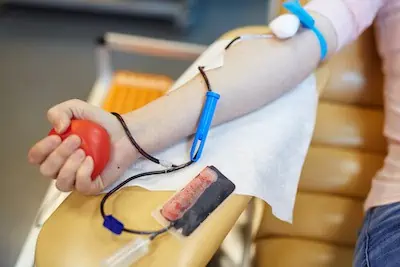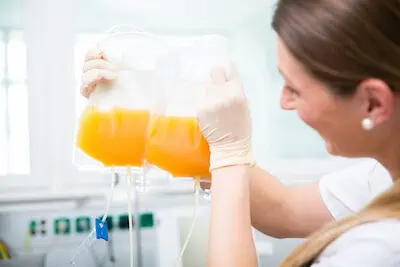I hate to admit this, but I’m a big chicken when it comes to needles. I’m awful when I need blood work done and tell everyone they’re a bunch of vampires. I usually get some eye rolls, but most of the staff tends to chuckle at this remark.
Still, giving blood and plasma are great things to do. I’m always struck by how generous people can be with their bodily fluids for life-saving purposes.
According to the American Red Cross, plasma is used for patients that come in for a shock, burn, and trauma. Those with liver disease and clotting problems may also receive plasma. The best donors are those with type AB blood as it is the only universal plasma, and as such, it can be given to a patient with any type of blood, saving time when seconds count.
While all blood types are welcome too, and the need for both blood and plasma is always in demand, there are certain instances where you will be turned away for plasma donations.
I know first-hand because my neighbor Mary Beth has AB blood and decided that she’d head over to donate not long after having her baby. She was turned away and came over to complain about it. I realized that while well-intentioned, Mary Beth didn’t know about these things, and I’d love to make sure you avoid that same disappointment by giving you the information you need so that you can donate if you can.
Can you donate plasma while breastfeeding?
Mostly, no. But! You MAY be able to donate plasma while you are breastfeeding. Every plasma donation center across the country has different guidelines. If you are interested in donating, call your local branch and ask them if you are eligible so you can save yourself a trip.

You may even find it on their website, but it is best to speak to someone to ensure you’re not wasting time.
Now, here’s where that “no” comes in. The WHO strongly advises against making a plasma donation while you’re breastfeeding.
As much as you may want to help, donating plasma while you’re nursing can lower your electrolyte levels and cause dehydration, which may affect your milk supply. You can also ask your doctor about this, but don’t attempt to hide it from the donation staff.
They will need a small sample of your blood to test it for HLA antibodies (I’ll get into that in just a minute), and you won’t be helping anyone at all if you don’t tell them that you’ve recently had a baby and are breastfeeding.
How long after having a baby can you donate plasma?
Well, you don’t have to wait forever, though the WHO again has some advice here, saying it’s best to wait a minimum of 9 months after giving birth to donate plasma or blood. This may vary by your local donation center too, so it can’t hurt to give them a call and get a confirmation.
This is important:
The vast majority of them require that you must be between 18 and 75 years old though some may let people as young as 16 donate and cap it at 65. You also need to be in good health, weigh over 110 pounds, and have no new tattoos or piercings (by “new,” they mean you can’t have just gotten them in the last 6 months).
Regarding tattoos, you may be exempt from this rule if you got yours from a licensed facility in the states of Alabama, Louisiana, Mississippi, or Texas, which only imposes a one-month waiting period.
Anyone who has had a miscarriage or terminated a pregnancy could be allowed to make a plasma donation after only 6 weeks, but some places will not let you until after 12 weeks.
But for any woman who has been pregnant, even if you are not nursing, you must be screened for HLA antibodies. (Yes, I’ll get to this in just a minute, I swear).
What if you’re trying to give blood or plasma in a different country?
That may complicate things, but La Leche League has some information. For the Canadian Blood Services and the UK NHS, women must wait 6 months postpartum. In Australia, they won’t let you until your baby is 9 months old or they have been weaned almost completely off breast milk.
In the Netherlands, they ask you to wait until 6 months postpartum, though, in New Zealand, they’ll let you after 3 months if your baby has mostly weaned.
It may seem unpleasant to be unable to help, especially if you are a willing donor. However, you lose lots of blood cells during the birthing process. It takes time for your body to recuperate, and especially if you’re nursing, you need that time to heal and provide for your baby through lactation.

Some doctors may approve you in a case-by-case situation, though, like if you’ve had a vaginal birth, you may get approval sooner than someone who had a c-section. But talk with your doctor first because blood impacts breast milk production quite heavily, so when you lose blood (including that precious plasma), you will shrink your breast milk supply.
Why am I not allowed to donate plasma after having a baby?
Ok, you’ve been patiently waiting to know what’s happening with that HLA thing. Thanks for hanging in there!
The vast majority of donation centers (there may be some out there that don’t, but most of them seem to) will require you to take an HLA test, regardless of how long ago you were pregnant.
If you are currently pregnant, you are most certainly not allowed to donate plasma anywhere on this planet. And if you were pregnant in the past 6 weeks, they’ll turn you away.
For those pregnant in the past, you will be given a test for antibodies for HLA – human leukocyte antigen. Should it come back positive, you will not be able to donate plasma for treatment purposes, but you will be able to do so to develop HIg, hyperimmune globulin, a COVID treatment. And even with this, you will still be permitted to donate regular blood.
Wondering what HLA has to do with anything? In your past pregnancies, you may have been exposed to it from your baby’s blood while pregnant or during delivery. Your body creates antibodies in reaction to this, and while they are not harmful to you, they can be very harmful to someone receiving your plasma donation.
What disqualifies you from donating plasma?
There are more restrictions on donating plasma rather than regular blood. As such, you’ll have to undergo a more rigorous screening process. It’s not personal, but please remember, if you’re donating plasma and want to help people in need, these screenings are in place to help them. You’d surely feel horrible if they used your plasma, which had HLA and caused harm to the recipient.
Additionally, they need to make sure no harm will come to you for donating, which is why they want your physical health to be strong enough to avoid any side effects.
They will ask you about what drugs you’re taking too, and while you might not be shooting up or anything, if you’re on prescription medications, some of them may make you ineligible to donate plasma.
Health conditions
Overall, you should be in good health when donating plasma. We’ve talked about not being pregnant, breastfeeding, or recently giving birth. But a few other conditions may disqualify you from your plasma donation:
- Recent dental work (meaning you’ve had it done within the past 72 hours)
- In the last month, you’ve received either the MMR vaccine or had chickenpox
- You’ve taken antibiotics (for oral, within 24 to 48 hours, and for injection within 72 hours)
- Diseases like viral hepatitis, bleeding disorders, tuberculosis, cancer, HIV, and other chronic diseases
Medications
If you’re taking Accutane Retin-A (the oral one) or finasteride, you won’t be able to donate. And if you’ve taken etretinate, you will be turned away too. This list should help, but if you’re taking any medications, it is a wise idea to ask your doctor and/or the staff at the plasma donation site if you are allowed to donate.
It’s nice to think about others and try to help by literally giving of yourself. In the event you can’t, there are other ways you can volunteer your efforts for the greater good. And remember, even if you test positive for HLA, they can still use that plasma for research.
I’m sure your local donation center would be thrilled with an offer to help, so if you aren’t permitted to donate plasma right now, find out what you can do to help!
Leslie Berry lives with her husband and two young daughters in Los Altos, California, where she loves helping other moms get comfortable with motherhood and embracing the insanity with facts peppered with laughs.
She loves eating too much sushi, exercising, and jamming out on her Fender. Read more about Leslie here.






